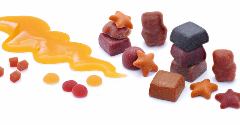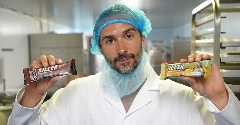News
How can brands navigate US tariffs on sugar alternatives?
7 May 2025US tariffs on monk fruit and stevia may push food and beverage brands to rethink their sugar reduction strategies.
As cost pressures mount, sucralose, currently exempt from tariffs, may gain ground and shift sourcing strategies in the sweetener industry.

Market research and advisory agency Kline + Company has explored the potential impact of US trade policy on food and beverage brands' sugar reduction efforts, and the role the tariffs could play.
Tariff pressures threaten natural sweeteners such as stevia and monk fruit
Dr Elizabeth Thundow, vice-president of food and nutrition at Kline + Company, told Ingredients Network that new tariffs may start to play a role in brands' sweetener decision-making processes and product reformulation.
“Stevia, for example, has played a key role in the shift from synthetic to natural high-intensity sweeteners in low/no added sugar products, accounting for over 90% of the volumes of natural high-intensity sweeteners used globally and across all products,” she explained.
Yet, in the US, stevia cultivation is limited, with most extracts, such as Reb Z and the increasingly preferred Reb M, being processed in China and India and imported into the US.
While these additional costs associated with sourcing stevia could lead to opportunities for alternatives to enter the market, many natural sweeteners, such as monk fruit, are also imported and would therefore be subject to similar tariffs.
Minimising the impact of additional costs
So, will brands absorb the extra cost, or shift away from natural sweeteners altogether?
Sweetener costs amount to only a fraction of the final price of finished products, and as such, Thundow imagines many brands will seek to absorb the extra cost, at least in the short term.
“However, for the longer term, I’m sure brands are reviewing their sourcing strategies across all ingredients, not just sweeteners, to minimise the impact of additional costs of tariffs as far as possible,” she explained.
Sweet proteins and reformulation
It could be that these tariffs open the door for innovative sweeteners, including sweet proteins like brazzein.
However, as Thundow noted, “reformulation is also costly and tricky, as changing sweetener can have a significant impact on product flavour and mouthfeel”.
But this, she explained, will ultimately depend on the balance between sweetener costs and reformulation costs for existing products.
But for brands that ruled out sweet proteins previously, for example, because of their higher cost, may now be more open to considering these alternative options.
Top tariff tips for food and beverage companies
For brands – in particular, those trying to balance cost, consumer expectations, and supply risk – Thundow offers some practical advice on navigating these tariffs.
• Stay up to date with the tariffs – understand which ingredients and which countries are impacted, and by how much.
• Evaluate ingredients to determine how tariffs will impact final product costs.
• Diversify supply chains and ensure relationships are maintained and/or established with multiple suppliers in alternative low or tariff-free regions. In addition, consider local sourcing where possible, although for many of these ingredients, this isn’t a realistic option.
• Explore cost-effective reformulations but ensure these maintain product quality and align with consumer preferences.
• Ensure alignment across multiple teams, including procurement, R&D, marketing, and finance teams, to make sure that any decisions taken consider cost efficiency, consumer expectations, and long-term strategy.
Related news

How younger consumers are redefining ingredient choices and rejecting brand loyalty
18 Nov 2025
Gen Z and millennial consumers’ preferences for transparency, functionality, and purpose are “redefining the very nature of consumption itself”, says SPINS.
Read more
Hybrid formats and flexible positioning to disrupt category norms in 2026
17 Nov 2025
Trend forecasters expect food and drink to move more fluidly across occasions, functions, and formats as consumers seek versatility, novelty, and convenience.
Read more
Empowering innovation in fortification and colouration
13 Nov 2025
Divi’s Nutraceuticals offers a large portfolio of innovative, high-quality ingredients for foods, beverages, and supplements, with bespoke solutions and expert support for product success.
Read more
From fruit to functional solutions: Meet Paradise Fruits at Fi Europe in Paris
13 Nov 2025
Paradise Fruits Solutions and Paradise Fruits Health will showcase their combined expertise in delivering innovative, fruit-based solutions to the food and beverage industry at the upcoming Fi Europe trade show (2-4 December 2025, Paris).
Read more
New UPF standard hoped to offer consumers ‘coherence and clarity’
10 Nov 2025
Ingredients companies are being urged to enter “a new era of partnership and innovation” following the launch of the industry’s first non-UPF verification scheme.
Read more
Cottage cheese makes a comeback as consumers call for cleaner labels
6 Nov 2025
From ice cream to dips and ready meals, cottage cheese is experiencing a renaissance as a high-protein, clean ingredient for health-conscious consumers.
Read more
Ingredient quantities mislabelled on popular protein bars, independent tests show
5 Nov 2025
Some popular protein bars contain more fat, carbs, and/or sugars than claimed on their labels, independent nutrition testing reveals.
Read more
Does promoting protein content push up plant-based sales?
27 Oct 2025
Promoting the protein content of meat-free products is a more effective sales strategy than adding carbon labels, a study of UK bakery chain Greggs suggests.
Read more
Agrigum Redefined FIBER
27 Oct 2025
Agrigum has transformed gum acacia into a natural, science-backed fibre that supports gut health, sustainability, and innovation across global food and nutrition applications.
Read more
Will Wicks’ Killer Bar harm the protein bar category?
23 Oct 2025
Joe Wicks’ deliberately dangerous protein bar is fuelling anti-UPF sentiment – but there are concerns that his messaging is misguided and could have unintended consequences.
Read more